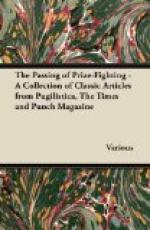We were stopped by Drusilla. “I don’t think much of the moral of that one,” she remarked. “It would seem to illustrate the Evil Consequences of Benevolence!”
“But she came alive again,” said Evadne, the youngest, in extenuation.
“And the wolf was killed,” we ventured in defence of our old story.
“Still,” persisted Drusilla, “you couldn’t call it encouraging.”
“Then in the other case,” went on Claude thoughtfully, “considering that she had been left in sole charge of the house and had no business to go out and leave it to the mercy of burglars, what moral are we to draw from the fact that she married a Prince and lived happily ever afterwards?”
“Most of them have that sort of moral,” said Drusilla. “And they are every one of them devoid of humour, except of the most obvious kind—no subtlety.”
“When I was your age,” said poor Louisa gently, “I used to laugh very heartily over the adventures of Tom Thumb.”
Claude seemed touched. “There are some capital situations in certain of them,” he conceded, “which might be quite effectively treated.”
“How?” we asked weakly.
It was Drusilla, the most alarming of the children, who finally undertook to sketch us out an example.
After a short meditation, “Something like this,” she said. “The situation, of course, you have met with before, but as remodelled you might call it—
The triumph of
virtue;
or,
the bad fairy
foiled.
A certain King and Queen had one daughter, to whose christening they invited a large company, forgetting as usual a particularly important and bad-tempered Fairy, who signified her annoyance in the usual manner.
The attendants of the little Princess (having read their story-books) were preparing dolefully enough to fall asleep for a hundred years, when the Fairy, with a contemptuous sniff, remarked that the spell would not take effect for some time yet.
They breathed again and had almost forgotten the affair by the time the Princess had grown up. But the Fairy had so arranged it that the spell fell upon the Princess at the time when she was engaged in making her choice of a husband from among the suitors who had arrived at her father’s Court.
The Princess was now bewitched in this way—that good men appeared bad, ugly men handsome, and vice versa. The Fairy had hoped that she would thus make a mess of her matrimonial affairs and live unhappily ever after.
But she had reckoned without the disposition of the Princess, a kind good girl with an overpowering sense of duty. When pressed to choose, she replied firmly, “I will have no other than Prince Felix.”
To her his ugliness seemed pathetic and his character evidently needed reformation




